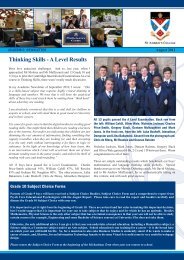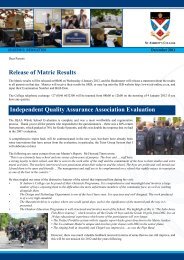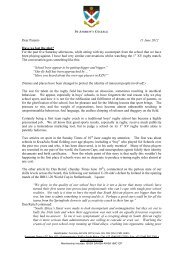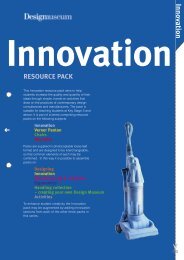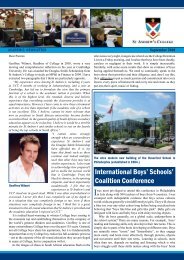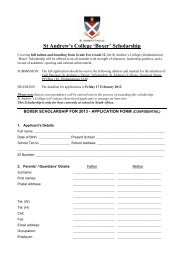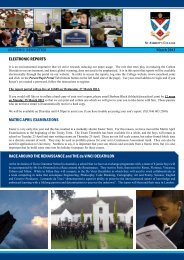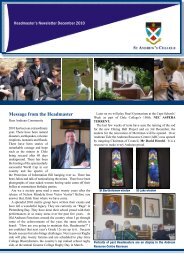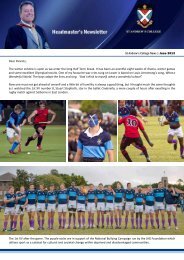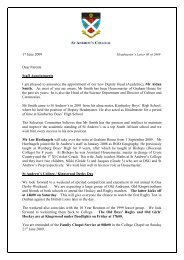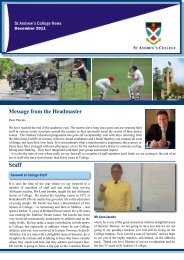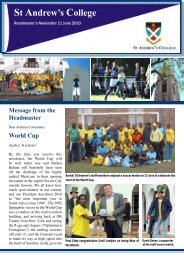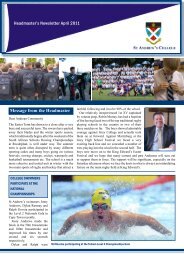Rowing Parents Handbook 2011 - 2012 - St Andrew's College
Rowing Parents Handbook 2011 - 2012 - St Andrew's College
Rowing Parents Handbook 2011 - 2012 - St Andrew's College
Create successful ePaper yourself
Turn your PDF publications into a flip-book with our unique Google optimized e-Paper software.
ROWING HANDBOOK<br />
<strong>2011</strong>/<strong>2012</strong>
CONTENTS<br />
PAGE<br />
• Message from the <strong>Rowing</strong> Master in Charge 4<br />
• Message from Chairperson of Parent Support Group Committee 5<br />
• The <strong>Rowing</strong> Club <strong>St</strong>ructure 6<br />
• History of <strong>Rowing</strong> at SAC 9<br />
• Regatta Program <strong>2011</strong> – <strong>2012</strong> 12<br />
• General Information<br />
– <strong>Rowing</strong> Season 13<br />
– Training 14<br />
– Crew selection 14<br />
– Equipment 15<br />
– <strong>Rowing</strong> Terminology 17<br />
– <strong>Rowing</strong> Club Costs 18<br />
– Regattas<br />
• Items to bring to regattas 19<br />
• The Regattas 20<br />
• Rowers’ dress 25<br />
• 1 st 8 Privileges & Traditions 26<br />
• Rowers’ Code of Conduct 27<br />
2
CONTENTS Cont’d<br />
• Understanding the Regatta Program 28<br />
• The Sport of <strong>Rowing</strong> 29<br />
• <strong>Rowing</strong> Websites 31<br />
• Information for the Boys 32<br />
• <strong>Rowing</strong> and Academics 35<br />
• Anti -Doping Policy 37<br />
• Information for the <strong>Parents</strong> 38<br />
• Appendices<br />
PAGE<br />
– Appendix I<br />
SAC <strong>Rowing</strong> Club <strong>Parents</strong> Support Group Terms of Reference 39<br />
– Appendix III<br />
Piper Contacts 40<br />
3
MESSAGES<br />
From the <strong>Rowing</strong> Master in Charge<br />
The 2010/<strong>2011</strong> Season was a challenging one, in many respects. Not only was the<br />
continuous afternoon slog to Port Alfred a long and arduous one, but we had to<br />
perform to our expectant norms of outstanding results. This made life very<br />
demanding for those who persevered, as so much expectation was put on their<br />
shoulders.<br />
But persevere they did and the seeds of such perseverance and dedication will<br />
hopefully bear fruit in the forthcoming season. I expect all our age groups to come<br />
into their own!<br />
The good news is that Settlers Dam is full , which is cause for celebration. We expect<br />
almost all our rowing activity to take place on the dam. This should give the club a<br />
much needed boost as everyone will enjoy more rowing time, more coaching time<br />
and of course way less hassle.<br />
On the school campus we have renovated our Ergo Room and may move to even<br />
better premises under the new dining hall. Everything is coming right for <strong>St</strong> Andrew’s<br />
<strong>College</strong> rowing which can only point towards an exciting, successful season ahead.<br />
See you at the waters edge!<br />
Donovan Cech<br />
4
MESSAGES<br />
From the Chairperson of the Parent Support Group Committee<br />
Welcome to all our <strong>Rowing</strong> <strong>Parents</strong>, and especially to our new parents and rowers.<br />
<strong>Rowing</strong> is no ordinary sport. You are embarking on an incredible journey of emotional<br />
highs and lows. Nevertheless one that will leave you a rowing convert, avid,<br />
(sometimes hysterical) supporter, and a <strong>Rowing</strong> Club family member.<br />
<strong>Rowing</strong> at <strong>College</strong> is a sport which has its foundations built well over 50 years ago. It is<br />
rich in tradition, history and success, with many fantastic moments woven into it's<br />
fabric. We depend on you, the committed SACRC parent body, to involve yourself in our<br />
wonderful club. Our goal is to support the rowing staff and boys, together with our<br />
primary aim of fundraising .<br />
As usual, this year we have an energetic volunteer committee, who have come up with<br />
exciting new initiatives. These include creating a template for annuity fundraising for<br />
the years ahead. As with any ideas, these will only come to fruition if we get your<br />
support, suggestions and Involvement . If you feel that you can help on any level,<br />
please do !<br />
We welcome all involvement and suggestions in our singleminded drive for a balanced,<br />
successful and happy group of rowers and Club .<br />
In closing, you will witness with pride, the gradual carving out of character,<br />
perseverance under pressure, focus and camaraderie in your boys that is synonymous<br />
with rowing.<br />
Enjoy the journey !<br />
Roy Slack<br />
5
CLUB STRUCTURE<br />
• All parents, rowing staff and rowers are members of the rowing club : the parents<br />
provide support in terms of fundraising, help at regattas etc.<br />
• See SAC <strong>Rowing</strong> Club <strong>Parents</strong>’ Support Group Terms of Reference : Appendix I<br />
SAC <strong>Rowing</strong> <strong>St</strong>aff :<br />
• <strong>Rowing</strong> MIC : Donovan Cech 083 561 7841<br />
• Director of Sport : Pete Andrew 083 301 1098<br />
• Supporting <strong>St</strong>aff : Harold Hobson 071 876 3910<br />
Simon Kroon 082 449 7043<br />
Mickey Paterson 083 412 8122<br />
Coaches :<br />
• 1 st VIII coach : Donovan Cech 083 561 7841<br />
• 2 nd VIII coach : Graham Allin 083 555 6295<br />
• U16 coaches Harold Hobson 071 876 3910<br />
Tom Cahill 082 331 8830<br />
• U15 coach Courtney De Barros 082 879 4492<br />
• U14 coach Julia Lindop 084 299 5935<br />
6
CLUB STRUCTURE<br />
School Office Bearers<br />
• Captain : Greg Slack 078 112 6672<br />
• Vice captain : Matthew Shone 084 407 1431<br />
• Boatman : Nick Fleischer 079 578 3927<br />
• Secretary : Michael Bennett 079 695 7912<br />
Election of the School Office Holders<br />
• Elections for the new Office Bearers are done within 30 days after SA Champs.<br />
• All boys who have rowed for at least one full season are entitled to vote once per<br />
office title.<br />
• No boy may hold more than one title in any given season cycle.<br />
Captain and Vice- Captain Job Description<br />
• The Captain and Vice- Captain should do their best to ensure the following:<br />
1. That all rowers uphold the Rowers Code of Conduct.<br />
2. That transgressors of this Code are reported to the <strong>Rowing</strong> MIC or a SAC <strong>Rowing</strong><br />
<strong>St</strong>aff Member.<br />
3. That all rowers understand and respect that the Coaches requests and<br />
instructions overrule any crew instructions or intentions.<br />
4. That along with the Boatman, they should be the first to arrive and last to leave<br />
regattas, ensuring that the rowers have completed all their necessary tasks.<br />
5. That they consider any request from a rower for permission to leave a regatta<br />
with balance, considering the rowers obligations to both the club and their<br />
personal commitments.<br />
6. That they attend all prize givings after regattas.<br />
7. That all boys receiving awards are present at regatta prize givings.<br />
8. Assist any rower in understanding any duty or commitment that the rower may<br />
be unsure about.<br />
9. Follow up on any rower who is absent from any duty, be it training, boat loading,<br />
and report the reason for absence to the Director of <strong>Rowing</strong>.<br />
7
CLUB STRUCTURE<br />
SAC <strong>Rowing</strong> Club Parent Support Group Committee <strong>2011</strong>/<strong>2012</strong>:<br />
• Chairperson : Roy Slack (Open, Eastern Cape) 083 6580599<br />
• Vice Chairperson : Tim Fleischer (Open, Eastern Cape) 082 5547669<br />
• Committee Members :<br />
• John Bennett (Open, Gauteng) 082 4615017<br />
• Ed Bovijn (Open, Eastern Cape) 082 4675773<br />
• Mark Moses (U16, Gauteng) 083 4546888<br />
• Colin Muskett (Open, Eastern Cape) 082 7793744<br />
• Sally Price-Smith (U15, Eastern Cape) 072 5051621<br />
8
HISTORY OF SAC ROWING<br />
Extracts from : M. 2008. The Boy in You: a biography of <strong>St</strong> Andrew’s <strong>College</strong>, 1855-2005.<br />
Simon’s Town: Fernwood Press. Pg. 407-410<br />
• Fifty years after the establishment of the <strong>St</strong> Andrew’s <strong>Rowing</strong> Club the school has a<br />
reputation as one of the finest rowing schools in the country. But there have been some<br />
moments of keen alarm and despair: moments when the existence of the club has hung<br />
in the balance and Council has held a sword over it. In both 1966 and 1977 Council felt it<br />
had no option but to declare the club “closed”.<br />
• The miracle of its rescue and subsequent rise to fame was encapsulated in the moment<br />
when the <strong>College</strong> crew took to the water at the Henley Royal Regatta in England in 2004.<br />
• “In the past no South African schools’ crew has finished higher than the top sixteen at<br />
Henley, so finishing in the top four was a sterling achievement for the <strong>St</strong> Andrew’s crew.”<br />
• It was not only a moment of triumph for John Gearing, the Springbok rower and gifted<br />
coach of the <strong>St</strong> Andrew’s squad, it was a moment to salute the perseverance and<br />
bulldog-tenacity of Axel Ohlsson, who, despite the appalling odds in the early days, had<br />
ensured that rowing at <strong>St</strong> Andrew’s would not die.<br />
• Tribute must also be paid to Martin Kennard, whose dedicated and skilled contribution<br />
elevated the standard of rowing to new levels, from which the success at Henley was<br />
made possible.<br />
• The first competition in which a <strong>College</strong> rowing team participated was the Annual<br />
Buffalo Regatta in 1959. Through the generosity of the Buffalo <strong>Rowing</strong> Club the <strong>College</strong><br />
IV was lent a boat and blades for the occasion. “They were not very successful,”<br />
commented the apologetic headmaster.<br />
• Nothing daunted, a second IV took to the water in 1959 and, within a year, the rowers<br />
had taken part in four regattas and won the School Coxed IVs in Bloemfontein. The first<br />
equipment was “White Rigger”, an old boat borrowed from Rhodes until <strong>St</strong> Andrew’s<br />
was able to buy its own “Chumph”, in 1959.<br />
• Training camps at the Kowie became an annual pattern and, in 1964, 18 boys attended a<br />
four-day training session. Subsequently, the First VIII came first in the Border Junior VIIIs<br />
– a great fillip to their confidence. During their university vacations two former <strong>College</strong><br />
rowing captains, David Wylde (1962) and Hugh Duncan Brown (1962), gave great<br />
assistance to captain Hugh Crail (1965) in preparing the team for competition, especially<br />
for the Buffalo Regatta – an event at which parents with homes at the Kowie or Kariega<br />
or in East London, provide hungry rowers with lunches, dinners and offers of<br />
warm beds. 9
HISTORY OF SAC ROWING<br />
• Today, it is evident that a successful rowing coach has time for very little else but training<br />
his crews, servicing his boats and organizing events. Hours, days and weeks are spent away<br />
from the school and it is a particularly taxing sport for a housemaster. In 1973 Axel handed<br />
over the <strong>Rowing</strong> Club to Chris “Megaphone” Morton (1964), a memorable senior student<br />
officer and an inspirational coach, and <strong>College</strong> crews took part in the Wemmer Pan Sprint<br />
Regatta and the Junior Tridents Provincial Eights at the South African Games.<br />
“Nevertheless, Axel continued to take a very active interest. The club had begun with a<br />
single crew of five and, by the time he retired, it had grown to 35, with a shadow<br />
membership of many more and a brand new boat from Australia.<br />
• In 1966 the rowing club had been rescued by a few determined Johannesburg parents. In<br />
1977 the Council again voted for the closure of the club. This would have been tragic in<br />
view of the enormous successes during Morton’s era, including the gathering of six major<br />
trophies in1975, in the year <strong>St</strong>uart Rennie, the <strong>St</strong> Andrew’s cox, was voted the best at the<br />
South African <strong>Rowing</strong> Championships and <strong>College</strong> became the first junior crew in South<br />
Africa to break the 5-minute barrier for the 1 500 metres with a time of 4 minutes 53.3<br />
seconds. But with expenses mounting it seemed there was no choice, despite the success<br />
of both the First VIII and the U15 squad, both of which made it into the finals of the South<br />
African <strong>Rowing</strong> Championships in 1976.”<br />
• When Council concluded in 1977 that the club would have to be closed, it did not count on<br />
the passion of Old Andreans Rodney <strong>St</strong>ill and Peter Searle, nor did it anticipate their<br />
generosity and commitment to keeping the boat afloat. Two minibuses were provided to<br />
help transport the boats, funds were forthcoming, and John Penberthy, that splendid<br />
swimmer, Springbok diver and all-round sportsman, took over the coaching for a short<br />
while. In his year as coach, five of the school rowers were selected for Border schools and<br />
the U15 VIII were unbeaten and won the national championships in Pretoria in 1978.<br />
• On the departure of John Penberthy in 1979, Axel Ohlsson once again took over as masterin-charge<br />
of rowing. Although his interest and commitment did not flag and he remained<br />
the guiding spirit, his enforced absences from Grahamstown on liaison work interfered<br />
with the cohesion of the club. His sudden death in 1986 left the <strong>Rowing</strong> Club rudderless.<br />
Dusty Kenyon kept it functioning during the Trinity Term of 1986 until Martin Kennard,<br />
who had successfully stroked for Oxford (1966-1968) and for Britain (1967), arrived at<br />
<strong>College</strong> and took the sport into realms of achievement which have been in the ascendant<br />
ever since.<br />
• Kennard’s arrival gave a depth to rowing coaching which established <strong>St</strong> Andrew’s as a<br />
major force in the sport in South Africa. Within a year he had introduced inter-house<br />
sculling and, by 1989, there was a third <strong>Rowing</strong> VIII for the first time in the history of the<br />
club.<br />
• The club went from strength to strength. Mark Bilbe and Barry Worthington were the<br />
champion rowing pair in South Africa in 1992 and the first <strong>College</strong> boys since the inception<br />
of the competition to win this title. In the same year Bilbe and Halvar Mathiesen<br />
represented South Africa as members of the Junior squad which competed in Norway.<br />
10
HISTORY OF SAC ROWING<br />
• At the end of 1992 Kennard’s son, James went from <strong>College</strong> for a sixth-form year at<br />
Radley in England. He captained the Radley first VIII and was selected as a member of<br />
the British VIII to compete in Switzerland. The crew won two golds. It was the start of a<br />
wonderful career in the sport for James Kennard and it was a devastating blow both for<br />
his family and for <strong>St</strong> Andrew’s when he was killed on his way to a regatta in 1997. Martin<br />
Kennard’s last year at <strong>College</strong>, 1994, was a vintage season for rowing. Grant Lapping and<br />
Richard <strong>St</strong>eel-Gray, son of Bruce (1966), a future chairman of Council, were selected to<br />
row as juniors for South Africa in Belgium and Norway and were rated among the top 18<br />
pairs in the West. That year the Senior VIII won the Selborne Regatta for the first time<br />
since its inception in 1962.<br />
• In the years between Kennard’s departure and John Gearing’s arrival Brendan Doolan<br />
and Mike Fennell took charge of rowing, with the help of various coaches. In 1995 <strong>St</strong><br />
Andrew’s First VIII, which had had a successful tour to Poland, won the South African<br />
Championships for the first time in 20 years and was invited to Henley. The oarsmen<br />
were all awarded Honours for their achievement.<br />
• In 1998 the First IV won at the South African championships but the First VIII came third,<br />
thus ending a three-year domination of the sport at school level.<br />
• Just as gentle Chris Rheeder had inspired a generation of rugby players in the 1920s,<br />
modest, self-effacing John Gearing has had a profound influence at <strong>St</strong> Andrew’s during<br />
the years that he coached rowing. As with Rheeder, his men would follow wherever he<br />
led. Never a raised voice, never a domineering word. His integrity was inspirational and<br />
his skill had earned him his Springbok colours as an oarsman. It is no wonder that Radley,<br />
that distinguished English public school with a strong rowing tradition, should have<br />
offered him the post of senior coach in 2007, but it was a huge loss for <strong>College</strong>.<br />
• <strong>Rowing</strong> became the prince of sports at <strong>College</strong>.<br />
• In 2001 <strong>St</strong> Andrew’s First VIII won the inaugural South African Schools Boat Race. In the<br />
next year five boys competed in the Junior World Championships in Lithuania, while the<br />
First IV gathered the laurels at the South African Junior Championships. In 2003 the<br />
senior crew went to the world championships in Greece, where they won bronze. When<br />
the oarsmen were all presented with their Honours awards at school, the whole of<br />
<strong>College</strong> spontaneously stood in homage.<br />
• Six of the rowers were selected in 2004 to row for South Africa at the World <strong>Rowing</strong><br />
Championships in Spain. They came fourth. Back home, they won the South African<br />
Schools Boat Race for the third time and the IV came first in the South African<br />
Championships. In the Jubilee year the VIII was triumphant in the South African Schools<br />
Boat Race and retained their South African Junior title. At Henley they competed against<br />
Abingdon and lost – but not without honour.<br />
• The bunting and the tradition, the elegant state-of-the art boats, the pedigree of the<br />
clubs, the oarsmen and the sleek skimming craft: this was a far cry form old “Chumph”<br />
wading up the river at Kariega with Axel roaring from the bank and Eric Tasmer cooking<br />
up eggs and bacon in Geoff Palmer’s cottage for the ravenous crews when they came<br />
back from a hot, salty, sunburned row up the river. How Axel would have rejoiced,<br />
remembering his own days in “boats” at Cambridge. 1111
REGATTA PROGRAM <strong>2011</strong>/<strong>2012</strong><br />
• Interhouse <strong>Rowing</strong> Regatta 7 August <strong>2011</strong><br />
• Settler’s Dam, Grahamstown<br />
• August Camp 30 Aug -5 Sept <strong>2011</strong><br />
• Settler’s Dam, Grahamstown - Open Squad, U16 Squad<br />
• Buffalo Heads Regatta 17 September <strong>2011</strong><br />
• Buffalo River, East London - All age groups<br />
• Eastern Cape Championships 22 October <strong>2011</strong><br />
• Buffalo River, East London - All age groups<br />
• Knysna Halfway Regatta 29-30 October <strong>2011</strong><br />
• Belverdere, Knysna - Opens, U16’s, U15’s<br />
• Nemato Social Regatta 5 November <strong>2011</strong><br />
• Tyume Dam, Hogsback - All age groups<br />
• Pre Schools Boatrace Camp 29 November to 8 December <strong>2011</strong><br />
• Port Alfred - 1 st 8<br />
•<br />
• Old Mutual Schools Boatrace 9-11 December <strong>2011</strong><br />
• Kowie River, Port Alfred - 1 st 8<br />
• January Camp 11-17 January <strong>2012</strong>( 1 st 8 :10-17 January <strong>2012</strong>)<br />
• Settler’s Dam, Grahamstown - All age groups<br />
• Eastern Cape Indoor <strong>Rowing</strong> Championships 21 January <strong>2012</strong><br />
• East London /Port Alfred - All age groups<br />
• ZRC / Grey Regatta 28 January <strong>2012</strong><br />
• Zwartkops River, Port Elizabeth - All Age Groups<br />
• Grey U14 Regatta 4 February <strong>2012</strong><br />
• Zwartkops River, Port Elizabeth - U14’s<br />
• River Vaal Regatta (4-5 February <strong>2012</strong>)<br />
• Vaal River, Gauteng - 1 st 8 (Optional -to be confirmed)<br />
• Settler’s Dam Sprint Regatta 12 February <strong>2012</strong><br />
• Settler’s Dam, Grahamstown - All age groups (TO BE CONFIRMED !)<br />
• Selborne Sprint Regatta & Buffalo Regatta 16-18 February <strong>2012</strong><br />
• Buffalo River, East London - All age groups except U14’s<br />
• SA Schools Championships 2-4 March <strong>2012</strong><br />
• Roodeplaat Dam, Pretoria - All age groups<br />
12
THE ROWING SEASON<br />
• <strong>Rowing</strong>, a major summer sport at SAC, takes place during the 3 rd term and the first<br />
half of the first term.<br />
• The <strong>2011</strong>/<strong>2012</strong> regatta program is slightly different to what it has been in the past.<br />
The first Regatta will be the Buffalo Heads Regatta in East London, which will be<br />
followed by the Eastern Cape Championships and then the Knysna Regatta and<br />
Nemato RC Social Regatta will end off the calendar year for most club members,<br />
except for the 1 st Eight who train on for the Old Mutual Schools Boatrace.<br />
• The Old Mutual Schools’ Boat Race (a 6km heads race) is held on the Kowie River in<br />
Port Alfred , normally over the first weekend of the December holidays. This is a<br />
national event for 1 st VIII crews and it is starting to attract overseas crews as well.<br />
• The second half of the season starts with <strong>Rowing</strong> Camp for the whole club at<br />
Settler’s Dam, normally held in the last week of the Christmas holidays (early to mid<br />
January. The ZRC/ Grey regatta is first up, followed by the Selborne Sprints and<br />
Buffalo Regatta in East London in February and finally the SA Champs in Gauteng, in<br />
early March.<br />
• The SAC 1 st Eight may participate in River Vaal Regatta (RVR) in Gauteng prior to the<br />
Buffalo Regatta<br />
• SAC rowers may attend the SA Senior Champs as well, normally end April , after<br />
which they may continue to SA Junior National Selection trials and if good enough<br />
may be chosen to represent SA at the Junior World Championships<br />
13
TRAINING<br />
• Training takes place either:<br />
1. On the school premises (SAC Ergo room or SAC <strong>Rowing</strong> Tank)<br />
2. At Settler’s Dam in the Thomas Baines Nature Reserve, and<br />
3. At Port Alfred on the Kowie River.<br />
• U14 and U15 boys are taught to scull (2 blades per rower) and may row singles,<br />
doubles, quads and octuples.<br />
• U16 and open boys may continue to scull ,but in addition they are taught to row<br />
with one blade (sweep oar rowing), stroke side (right) or bow (left).<br />
• Training times are set by the age group coach, in collaboration with the Director, a<br />
week in advance and boys may not miss training except for medical reasons. The<br />
coach must be informed as far in advance of the training session as possible, in<br />
order for him /her to be able to organize a substitute rower for the boat.<br />
CREW SELECTION<br />
Crews will be selected to compete in regattas by the Age Group Coaches in<br />
collaboration with the Director of <strong>Rowing</strong>.<br />
There are a number of factors taken into account in selecting a crew:<br />
1. Ergo Trial Times – show raw strength, endurance, determination and power to<br />
weight ratio.<br />
2. <strong>Rowing</strong> Technical Ability<br />
3. Seat Boat Racing Ability – boys may race a series of races in different<br />
combinations.<br />
4. Personality – team harmony is important, but all boys should be encouraged<br />
to work together towards common goals.<br />
5. Commitment and Training Ethos<br />
14
ST ANDREWS COLLEGE ROWING CLUB<br />
INVENTORY<br />
LISTING<br />
Jun-11<br />
EQUIPMENT<br />
ITEM BOAT BOAT NAME BOAT MAKE MODEL COMMENTS<br />
1 8+ PERSEUS FILIPPI F09 1ST 8 BOAT<br />
2 8+ MORRIGAN FILIPPI 2ND 8 BOAT (U16A RACING BOAT IF NO EVENT CLASH)<br />
3 8+ PARKIN JOHN WAUGH U16 BOAT<br />
4 8+ PEGASUS JOHN WAUGH 1 PIECE ANY CREW<br />
5 8X ISIS JOHN WAUGH U14 / U15<br />
6 4+ / 4X OPTIMUS FILIPPI F34 RACING BOAT ONLY (EXCEPT 1ST 4+ TRAINING)<br />
7 4+ ATHENA JOHN WAUGH 1ST / 2ND / U16A 4+<br />
8 4+ TRAKAI JOHN WAUGH 2ND / 3RD / U16A / U16B 4+<br />
9 4+/4X POSEIDON JOHN WAUGH U15 A / U15B 4X<br />
10 4X QUO VADIS JOHN WAUGH U15B / U14A 4X<br />
11 4X / 4+ AFRICUS JOHN WAUGH U14 A/U14B 4X<br />
12 2- / 2X ARO FILLIPPI 2ND / 3RD / U16A /U15A 2- (X)<br />
13 2- SPIRIT OF DAVE TRIP FILLIPPI 1ST 2- / (U16A 2- at BUFF and SA Champs Race only)<br />
14 2-/2X GOWRIE JOHN WAUGH U16 A /U16B /U15A / U15B / U14A / U14B 2- (X)<br />
15 2-/2X VASCO JOHN WAUGH U16 A /U16B /U15A / U15B / U14A / U14B 2- (X)<br />
16 2-/2X MAVERICK JOHN WAUGH U14 - TRAINING BOAT<br />
17 1X NEW SCULL JOHN WAUGH 1ST/ 2ND/ U16A/ U15A (U14A at SA Champs only)<br />
18 1X YELLOW JOHN WAUGH<br />
1ST / 2ND/ 3RD / 4TH/ U16 A /U16B /U15A / U15B / U14A /<br />
U14B<br />
19 1X SPIRIT OF MACKAY JOHN WAUGH<br />
1ST / 2ND/ 3RD / 4TH/ U16 A /U16B /U15A / U15B / U14A /<br />
U14B<br />
1ST / 2ND/ 3RD / 4TH/ U16 A /U16B /U15A / U15B / U14A /<br />
20 1X PRAYING MENTIS JOHN WAUGH<br />
U14B<br />
15
EQUIPMENT USE<br />
BOAT USE<br />
• Crews are assigned boats as per the equipment listing on page 15<br />
• Deviation from this listing must be approved by the SAC <strong>Rowing</strong> MIC prior to use<br />
and approval is made at the MIC’s sole discretion, bearing the following in mind:<br />
1. The approved use does not negatively influence the performance of any other<br />
crew that qualifies to row in that particular boat as per the listing.<br />
2. The new crew rowing the boat has the necessary technical ability to perform in<br />
it.<br />
3. The new crew rowing the boat has the necessary skills so as to not damage the<br />
boat whilst getting on and off, as well as whilst on the water itself.<br />
• Boys are responsible for the equipment they use. Damage must be reported to the<br />
MIC / coach immediately, so that repairs can be arranged.<br />
• Boys have to keep their boats clean ; it is the crew’s responsibility to make sure that<br />
boats are washed and packed, securely tied on trailers or racks when stored<br />
outdoors. The coach will check that this has been done adequately.<br />
• At regattas it is the school office bearer’s responsibility (Capt, V-Capt & Boatman),<br />
supported by the 1 st VIII, to make sure that the crews have packed, loaded their<br />
equipment and that all are secured on trailers etc.<br />
• Crews pack their own boats : each crew reports for boat loading and unloading<br />
before and after all regattas and camps in accordance with the boat loading<br />
schedules.<br />
• The most important loading event of all is the unloading and cleaning of boats after<br />
the SA Championships. ALL rowers and coxes must be prepared to spend a full<br />
afternoon in the week after the SA Champs to fulfil this task. It would usually be the<br />
Wednesday afternoon or Sunday afternoon following the regatta. Boys must notify<br />
the MIC, in person, by Tuesday 2pm latest, in that week, if they cannot attend the<br />
unloading.<br />
16
ROWING TERMINOLOGY<br />
• Blade / spoon – the part of an oar which propels the boat.<br />
• Bow – Front of the boat with a bowball on its tip for safety.<br />
• Bowman – The rower in the bow of the boat. When the boat is coxless (ie. no<br />
coxwain) the bowman issues the commands and steers the boat.<br />
• Bowside – Right side looking from stern to bow (green colour on oars)<br />
• Catch – The beginning of the stroke where the blade is inserted into the water<br />
• Coxwain – The person who steers the boat. He either sits in the stern in an eight<br />
or lies in the bow in a four.<br />
• Double – A sculling boat with 2 rowers.<br />
• Drive – the phase of the rowing stroke which propels the boat.<br />
• Eight – A sweep oar boat with 8 rowers.<br />
• Feathering – When the blade is turned horizontally during the recovery.<br />
• Finish – When the oar is taken out of the water.<br />
• Footboard – The device you strap your feet into.<br />
• Four – A Sweep oar boat with 4 rowers.<br />
• Gunwale / Gunnel – The top edge of the side of a boat.<br />
• Gate – The device that holds the oar and allows it to pivot around the rigger pin.<br />
• Pair – A sweep oar boat for 2 rowers.<br />
• Pin – The steel bar attached to a rigger which holds the gate in place.<br />
• Port / <strong>St</strong>roke Side – Left side looking from stern to bow ( red colour on oars)<br />
• Quad – A sculling boat for 4 rowers.<br />
• Recovery – The slide forward from the finish to the catch of a stroke.<br />
• Rigger – An aluminium / carbon extension attached to the boat which holds<br />
the pin and gate.<br />
• Sculling boat – A boat which has rowers with 2 oars each.<br />
• Shell – The boat body.<br />
• Single – A sculling boat for 1 person<br />
• Slide – The seat that the rower sits on in the boat.<br />
• Squaring “up” – When the blade is turned from feathered (horizontal) to vertical.<br />
• <strong>St</strong>ern – The rear of the boat.<br />
• <strong>St</strong>roke – The rower who is at the back of the boat ( but in front of the rest of<br />
the crew.) He sets the crews pace.<br />
• Sweep - A boat in which each rower has one oar.<br />
17
ROWING CLUB COSTS<br />
The following expenses are covered by school fees:<br />
• Coaches wages and salaries<br />
• Equipment<br />
• Transport of boys and equipment to local training venues and regattas.<br />
• Motor boat petrol<br />
• Repairs and Maintenance of equipment.<br />
• ROWSA Club Affiliation<br />
• General Expenses<br />
The following expenses are covered by parents:<br />
These will typically get charged to your school account.<br />
• <strong>Rowing</strong> kit (R 150/ tri-suit)<br />
• Accommodation and flights (where applicable) for rowers and coaches at all<br />
regattas.<br />
• Regatta fees<br />
• ROWSA Rower membership (R100) and Settler’s Dam Boat Club Membership (R50).<br />
• Camp meals /food (there may be meals debited to your account in term, to offset<br />
such expenses.)<br />
One should estimate these expenses to total between R 7 000 and R 10 000 per annum<br />
all in, depending on which crew / age group you son is in.<br />
Revenue generated out of SAC <strong>Rowing</strong> Club activities<br />
• One of the most important functions of the <strong>Parents</strong> Support Group is to raise funds<br />
for the rowing club : the current annual target is R 200 000.<br />
• Funds are raised in many ways, e.g. golf days/ dinners / auctions / shows / sales of<br />
goods / donations / requested voluntary annual fees – currently R1000 per rower.<br />
• All revenue realized from fund raising activities is to be paid into the SACRC account<br />
for the benefit of the club and its activities. The committee shall have the discretion<br />
to do the following:<br />
1. Offer financial support to any SACRC rower representing a provincial or national team. If<br />
the financial assistance is not used by the rower for the intended purpose, it must be<br />
refunded to SACRC by the parent receiving the financial assistance.<br />
2. Use the revenue received for the running of the SACRC activities and / or for equipment<br />
purchases.<br />
3. No-one may benefit financially from the SACRC activities without the approval of the<br />
committee. Any expenses incurred in raising the revenue must be paid by SACRC.<br />
18
REGATTAS<br />
Items to bring to Regattas (<strong>Parents</strong>)<br />
• Binoculars<br />
• Camera<br />
• Sunscreen<br />
• Sunglasses<br />
• Deck chair<br />
• Gazebo or beach umbrella. We have a few gazebos, some exclusively for the boys at<br />
regattas and 2 for parents at SA Champs. These 2 are stored by Greg and Judy<br />
Hunter who erect them on the SACRC allocated “:spot” for SA Champs. They are<br />
usually supplemented with other gazebos to provide maximum shade as it can be<br />
very hot<br />
• Hat<br />
• Wet weather gear when rain looms.<br />
• Supporters’ shirts, hats will be available for sale at regattas from Sally Price- Smith.<br />
• Regatta Draw and Program<br />
• We will endeavour to forward all parents the regatta program. However the Draw<br />
may change on the last day or overnight before the regatta starts, so it is always<br />
good to download it from www.regatta.co.za as late as possible to ensure there<br />
have been no changes to starting times.<br />
• Cooler boxes with refreshments of your choice are allowed at all regattas except the<br />
Selborne and Buffalo Regattas.(a cash bar, tuck shop and take away meals are<br />
available)<br />
19
REGATTAS<br />
• Buffalo Heads Regatta – (Mayors Plate) 33° 1'30.53"S 27°53'26.03"E<br />
• Hosted by Selborne and Clarendon, this is a one day regatta that normally falls on the<br />
last Saturday of October, but will, this year, be our first.<br />
• The entire club departs and returns on the same day.<br />
• Crews race a number of long distance heads races with the Mayors Plate being the<br />
premier event in Fours.<br />
Eastern Cape Championships<br />
Buffalo and Selborne Sprints Regatta<br />
• The Buffalo Regatta began in 1881 and has been held every year since then except for<br />
some interruptions during the war years. Two large silver trophies, valued at R1m and<br />
R1.5m respectively, are competed for : the Silver Sculls (Men’s sculls) and the Grand<br />
Challenge (Men’s coxless fours). The Grand Challenge Trophy stands 1.2 m tall.<br />
• Selborne Sprints are raced over 500m, the Buffalo regatta over the normal 2000m. The<br />
course is run downstream and is affected by tides, currents and wind.<br />
• <strong>Parents</strong>’ Function :<br />
• There is normally a parents' dinner on the Friday evening of the Buffalo Regatta : this is<br />
just a social event and a good time to meet new parents and catch up on SACRC<br />
activities. In the past this function has been held at the Blue Lagoon Hotel or the Old<br />
Selbornians Club : details will be emailed to parents from the chairman closer to the<br />
time.<br />
20
REGATTAS<br />
• ZRC / Grey Regatta 33°50'13.95"S 25°34'11.29"E<br />
• Held in January on the Zwartkops River outside Port Elizabeth. The entire club<br />
departs and returns on the same day.<br />
• Directions<br />
• From Port Elizabeth<br />
• Follow the signs to Grahamstown until you get the offramp to Swartkops. Turn left<br />
at the first stop on the bridge and *** right at the first traffic light. Take a left turn<br />
at the very next traffic light into the road to Perseverence. You will pass a Salt<br />
Works on your left. You will come to a right turn to Redhouse. Drive into Redhouse,<br />
the road will turn to the right and then left over the railway track. Go left and follow<br />
the road keeping right until the road turns right onto the river front.<br />
• From Grahamstown<br />
• Take the Swartkops offramp. This is the first turnoff once you have crossed the<br />
Swartkops River. Turn right at the <strong>St</strong>op and then follow instructions ***<br />
• Knysna Regatta 34° 2'47.88"S 23° 0'0.57"E<br />
• This has now become a two day regatta, normally either the second last or last<br />
weekend of October. It is held on the western side of the lagoon in Belvedere<br />
Village.<br />
• Normally only the 1 st Eight and Under 16 Eight participate. The crews race sprints<br />
over 1 000 meters on the Saturday and the 1 st Eight races a heads race early on the<br />
Sunday morning. The team departs on the Friday morning and returns on the<br />
Sunday evening.<br />
• From George (N2)<br />
• Turn left at the Belvedere sign, (last turn off before the bridge over the Knysna river.<br />
***Turn right immediately under the bridge. Turn left into Belvedere and follow<br />
sign to Belvedere Manor. The venue is below the Hotel on the lawns in front of the<br />
lagoon.<br />
• From Port Elizabeth<br />
• Drive through Knysna, along the lagoon. Drive over the Knysna River bridge and<br />
turn right immediately. Follow instructions above ***<br />
• <strong>Parents</strong> usually have a get together on the Saturday night prior to the Sunday 21<br />
Heads Race.
REGATTAS<br />
• Old Mutual Schools Boatrace 33°35'40.81"S 26°53'24.97"E<br />
• Hosted by SAC, this event is held in Port Alfred on the Kowie River on the Saturday<br />
and Sunday of the first weekend in December. This is an event for 1 st Eights only (1 st<br />
Quads for girls).<br />
• Modeled on the Oxford / Cambridge boat race, crews race a heads race over 6km<br />
(4km for Girls). Crews then race finals on the Sunday in a one on one format based<br />
on times attained, from the day before. (1 st vs 2 nd in the “A” Final, 3 rd vs 4 th in the<br />
“B” Final)<br />
January <strong>Rowing</strong> Camp<br />
• This camp is normally held in the week prior to the start of school in January and<br />
involves the entire club as well as new boys who would like to attend, regardless of<br />
whether they are going to do rowing as a summer sport or not. The <strong>2012</strong> camp will<br />
take place at <strong>St</strong> Andrew’s <strong>College</strong> to take advantage of our on campus training<br />
facilities as well as the beautiful water which we currently have at Settler’s Dam. It<br />
is normally six days in duration and boys are either collected from the airport, or<br />
they can be dropped off in Grahamstown.<br />
• On the Saturday night there is usually a function for parents and the boys.<br />
• This camp is a great opportunity for new boys to make friends with their peers and<br />
meet some of the older boys at the school. They learn a new skill which they can<br />
use as their “New skill learned” in the Bronze Section of the President’s Award<br />
Program which many boys will get involved in once school starts. Most of all they<br />
can make an informed decision about which summer sport to choose, something<br />
that can become a life changing experience.<br />
22
REGATTAS<br />
• SA Champs 25°37'21.71"S 28°20'59.30"E<br />
• This regatta normally coincides with half term which means that the boys don’t<br />
have to be away for an extra long weekend and so don’t miss even more school.<br />
The boys normally fly up on the Wednesday and back to Grahamstown on Monday.<br />
• The 1 st VIII has a different program. This crew trains at altitude – either in Gauteng<br />
or at Hogsback – for the week prior to SA Champs. They may fly separately and they<br />
may also stay in different accommodation from the rest of the club . This varies<br />
from year to year.<br />
• The regatta usually takes place at Roodeplaat Dam, North East of Pretoria . The<br />
event starts on Friday with the heats and finals of all sculls and pairs. Saturday and<br />
Sunday usually have a mix of boat classes culminating in the 1 st Eights final which<br />
is the last event of the championships<br />
• All boys stay together in their crews at the accommodation under the supervision<br />
of their coaches and supporting teachers and they usually eat breakfast and supper<br />
there.<br />
• Entrance tickets for SA Champs will be on sale at the Buffalo Regatta – from the<br />
chairman ; otherwise they may be bought at the dam – there is usually a small<br />
discount for pre-purchased tickets. There are a lot of B&B’s and self catering<br />
accommodation units available in the area. A list of all the options , with contact<br />
details is available at www.dinokeng.net<br />
• Accommodation in the Northern suburbs of Pretoria has also proven to be suitable<br />
for quick access to the N1. These areas include Lynwood, Lynwood Glen, Lynwood<br />
Ridge, Silverton, Murrayfield, Arcadia and Hatfield.<br />
• Each school is allocated a ‘spot’ at the regatta and Judy and Greg Hunter erect the<br />
SACRC gazebos on the SAC spot, so look out for it and join the party ! It’s a festive<br />
occasion : there is food and drink on sale but you may wish to bring your own<br />
cooler box.<br />
23
REGATTAS<br />
• Sleepouts are not allowed during regattas, i.e. if the regatta is held over a few days,<br />
boys must sleep with the rest of the crew until the completion of the regatta. Boys<br />
may go out for meals with their parents only if they have permission from their<br />
coach.<br />
• <strong>Parents</strong> may take their boys on Sunday evening after the prize giving and after all<br />
the boats have been loaded and are ready for departure. If it is half term the boys<br />
may decide not to travel back with the rest of the rowing club and may arrange<br />
their return flights themselves : this must be agreed with and communicated to the<br />
<strong>Rowing</strong> MIC and the boy’s coach.<br />
24
ROWERS’ DRESS<br />
Training Dress<br />
January Camp<br />
• January Camp is the only time that boys may wear civvies, primarily because many<br />
new boys do not have school rowing kit yet, and some may not continue rowing<br />
either.<br />
• Training must, however be done in clothing that is both appropriate for sporting<br />
activity and acceptable considering that the boys are in the public eye.<br />
• Boys should ensure they have a haircut BEFORE they arrive on camp, as the club<br />
will not tolerate hairstyles that are not neat or suitable. Once again this is because<br />
we will be training in the public eye.<br />
Normal Afternoon Training<br />
• Boys should wear SACRC tri-suits only with a white SAC t-shirt whilst training.<br />
• Boys must also commute to training in their school tracksuits, unless it is hot and<br />
they have permission from the Director of <strong>Rowing</strong> or Supporting Teacher or coach,<br />
in which case they may wear their white SAC t shirts, SAC <strong>Rowing</strong> Club golf shirt and<br />
SAC shorts.<br />
Regatta Dress<br />
• When boys travel to regattas, they must wear the same dress : either all tracksuits<br />
or all in chinos etc : this will be communicated by the Director of <strong>Rowing</strong>.<br />
• At regattas boys must wear appropriate sports uniform. Civvies may be worn only<br />
when away from the regatta and when not travelling as a team / school.<br />
• Tri-Suits:<br />
• The first team has a different tri-suit from the rest of the club.<br />
• The 2 nd VIII wears the same tri suit as the rest of the club with a big college badge<br />
on the chest.<br />
• The rest of the club rows in the official SACRC tri-suit.<br />
25
ROWERS DRESS<br />
1 st Eight privileges :<br />
• Training- A 1 st Eight rower may wear any tri-suit, but it must be both respectable<br />
and in a respectable condition. They may also wear any training shirt, as long as it is<br />
either plain blue, white, black or red.<br />
• The 1 st Eight requires more clothing than any other team, both for training (they<br />
train more than any other crew) and wearing before and during regattas.<br />
• SAC 1 st Team tracksuit – (same as other sports’1 st team tracksuit)<br />
• White shorts with light blue and navy stripes down the one side, the rowing badge<br />
on the other side, and the sponsor on the left back.<br />
• Light blue vest [Mullins house colour] with rowing badge on the chest screen<br />
printed in navy.[training]<br />
• Old school shirt: grandpa vest : White t-shirt with buttons down front done in light<br />
blue and navy, also the same light blue and navy trimmings around neck and arms<br />
and rowing club badge on left breast.<br />
• Old Khaki t-shirts (plain white short-sleeved t-shirt from Cape Union Mart) with<br />
rowing club badge (SAC badge with crossed oars) and “ST ANDREW”S COLLEGE”<br />
across the top of the badge and “1 st VIII” underneath the badge.<br />
• Short sleeve white utility shirt – tight fitting.<br />
• Long sleeve white utility shirt – tight fitting<br />
• Sleeveless wind breaker / sports jacket.<br />
• Tog bag same as rugby team<br />
• Cap<br />
• The 1 st Eight kit may be sponsored ; the sponsor’s logo will then be embroidered on<br />
the back of the neck and on the tog bag.<br />
Traditions<br />
• At SA Champs and Boat race the 1 st VIII is piped onto the water, and off if they win<br />
(sometimes even if they just do jolly well) ; the piper plays “Highland Cathedral”.<br />
• Also at SA Champs the 1 st VIII, IV and / or pair receive any awards they might have<br />
won dressed in kilts, shirts, school tie and blazers, long socks and black shoes. It is<br />
up to the boys, coach and parents of the 1 st VIII to make sure that the boys have<br />
kilts and that a piper is available. (See Appendix III for Piper Contacts).<br />
• The boys in the 1 st VIII traditionally shave their heads for SA Champs.<br />
• If a 1 st team (VIII, IV, pair) wins a race they may carry their oars from the winner’s<br />
jetty held vertically.<br />
26
ROWERS’ CODE OF CONDUCT<br />
As a member of the <strong>St</strong> Andrew’s <strong>College</strong> <strong>Rowing</strong> Club I shall, at all times, endeavour to:<br />
• Uphold the name of <strong>St</strong> Andrew’s <strong>College</strong>.<br />
• Commit to my crew for a full season ie October to March so as to not let my team<br />
down half way through a season.<br />
• Set the benchmark for sportsmanship, both on and off the water.<br />
• Follow instructions given by coaches, captains and rowers my senior, to the best of<br />
my ability.<br />
• Show consideration and respect to opponents, team mates, umpires and<br />
spectators.<br />
• Show consideration and respect to fellow club members especially those my senior.<br />
• Remember that I am rowing as part of a team and put the interests of my fellow<br />
rowers and my school before self-glorification.<br />
• Be loyal to the team and not let my team mates down by being absent from<br />
practices and regattas without a legitimate excuse.<br />
• Be punctual for practices and regattas.<br />
• Not leave a regatta venue without having permission from the Captain or Vice<br />
Captain to do so, whether during or after a regatta. If they are not available I will<br />
ask my coach or the <strong>Rowing</strong> MIC for permission to leave.<br />
• Excuse myself in person, from my coach or the <strong>Rowing</strong> MIC, as soon / early as<br />
possible, when I am ill or injured.<br />
• Dress correctly for regattas or for travel thereto. ( see ROWERS’ DRESS)<br />
• Thank all officials, coaches, teachers and parents after regattas, coaching sessions<br />
and tours.<br />
• Treat all rowing equipment in my use with the utmost care and respect.<br />
• Clean and pack away ( in the correct place) any equipment my crew or I may have<br />
used.<br />
• Report any damage that my crew or I, may do to any equipment or object whilst on<br />
the water, or in taking the equipment to or from the water, whether it belongs to<br />
SAC <strong>Rowing</strong> Club or not.<br />
• Consider the safety of my crew, other crews or other people when on the water or<br />
anywhere within a regatta venue.<br />
SIGNED:<br />
DATE:<br />
27
UNDERSTANDING A REGATTA PROGRAM<br />
A B C D E F<br />
• A - The number of the Event<br />
• B - JM or MJnr or B for boys<br />
• B - JW or W Jnr or G for girls<br />
• B - This is followed by the age group:<br />
• B - Either U14, U15, U16 or 1 st (OP or U19) age groups.<br />
• B - A, B, C or D is the category division. For the Open / U19 age group the divisions<br />
would be listed as 1 st , 2 nd , 3 rd etc.<br />
• B - Boat Class<br />
• B - 1, 2, 4 or 8 indicates the number of rowers / boat size participating in the<br />
event.<br />
• B - X - is for Sculling Events (2 oars per boy)<br />
• B - Mainly done in the U14 and U15 age groups.<br />
• B - 1x is a single scull One boy with 2 oars<br />
• B - 2x is a double scull Two boys with 2 oars<br />
• B - 4x is a quad Four boys with 2 oars<br />
• B - 8x is an octuple Eight boys with 2 oars<br />
• B - + or - is for Sweep Oar Events (1 oar per boy)<br />
• B - Only U16 and Open age groups<br />
• B - 2- is a Pair Two boys with 1 oar each<br />
• B - 4+ is a Four Four boys with 1 oar each<br />
• B - 8+ is an Eight Eight boys with 1 oar each<br />
• B - The “+”or “-” describes the presence or absence of a coxswain in the boat.<br />
• B - 4+ is a Coxed Four, 4- is a Coxless four<br />
• C - Describes the event as either H = heat, S = semi-final or F = final<br />
• D - Race <strong>St</strong>arting Time<br />
• E - The Race distances of 500m, 1 000m or 2 000m<br />
• F - The school / club with the name of the stroke underneath. 28
THE SPORT OF ROWING<br />
• <strong>Rowing</strong> is not just a sport, its a discipline. Just like flyfishermen spend their whole<br />
lives perfecting the cast, so the rower continually strives for that perfect stroke, the<br />
stroke which leaves the boat perfectly balanced, with a maximum possible speed for<br />
his effort.<br />
• But then there’s another dynamic in that the rower is often not alone. There is a crew<br />
of rowers, all working together, synergising their efforts to make the boat go faster.<br />
• A crew of individuals who may be very different in terms of personality, motivation,<br />
emotion, skill and experience and yet they have a common goal that they all must<br />
achieve through commitment, perseverance and most importantly mutual tolerance<br />
and respect for each other.<br />
• Some say that “a crew is only as good as it’s weakest rower” and so the stronger<br />
rowers must focus on improving their team mates abilities, as this may prove more<br />
important than just focusing on their own. Encouraging, motivating through positive<br />
re-inforcement, whilst still having attention to detail, will be some of the challenges<br />
that they face, should they wish to achieve. And that weakest rower will know that he<br />
cannot give up, and let down his team mates who have trained as hard, if not harder<br />
than himself. Persevere, never give up!<br />
• As a rower, you are going to learn the hard way. Its physically demanding , to say the<br />
least. Only cross country skiing can compete with rowing in terms of the energy to<br />
time exercised. In the last 500 meters of a race you are going to be asking yourself the<br />
question: Why do I do this?..... It’s excruciating! All the energy is gone. The muscles<br />
are burning. The body is well into oxygen debt...... You could easily just throw in the<br />
towel but you cannot. You must persevere! Your crew is depending on your<br />
performance. One “soft” stroke could be the difference on the line!<br />
• And that is why you do this! To endure! To learn that every tough challenge has a<br />
finish line, and you need to cross that line, to realise your potential as both an<br />
individual and as a crew. The pain will go away, but knowing you did not do your best<br />
lasts a lot longer!<br />
• So its not just about winning and beating other people. Its about beating yourself. Its<br />
about overcoming your doubts through dogged determination , self -belief and belief<br />
in your crew.<br />
• And this takes time, time in the boat, time on the ergo, time in the gym and even just<br />
time communicating and bonding with your team mates. And the training on the<br />
water must be seen as a blessing. How many sports are there which present such<br />
dynamics, within such beautiful surroundings, in any weather conditions, day after<br />
day, all year round?<br />
• Your life will never be the same . You will become haunted by water. You will come<br />
across stretches of water that will call on you to explore and conquer. Not only the<br />
water, not even your technique but more likely yourself! The sound of your heart<br />
drumming in your head, to the rythym of each and every stroke as the water boils<br />
off the boats bow.<br />
29 29
THE SPORT OF ROWING<br />
• <strong>Rowing</strong> goes back some 2 or so centuries, to times when man discovered that an<br />
oar could be more effective when worked against a fulcrum. For the first time boats<br />
started “ going backwards”. Most of the rowing was done under duress in moving<br />
large “warships” in the midst of battle.<br />
• The first known competitive regatta was held in Venice, Italy, in 1315. It was initially<br />
popular in the Mediterranean, but soon spread throughout Europe.<br />
• The first regatta in Britain was held at Gravesend Town in 1698. Throughout the<br />
next century boats grew from pairs to fours , sixes and eventually eights, which<br />
were first raced in London in 1778.<br />
• Arguably the most famous race for eights is the Oxford vs Cambridge Boatrace<br />
which first took place in 1829 and continues annually to this day, with the challenge<br />
always taking place on the Thames, in London on the first Sunday in April. Here the<br />
crews have a head to head battle over a course distance of 6,3km.<br />
• The biggest club regatta in the world is undoubtedly the Henley Royal Regatta,<br />
which takes place in Henley on Thames, England, annually, in the first week of July.<br />
It has been in existence since 1839 and continues to attract crews from all<br />
continents.<br />
• FISA ( Federatione Internationale societe d’Aviron) is the international rowing body<br />
which was first established in 1892, four years prior to rowing’s first appearance at<br />
the Olympic Games which took place in Athens, Greece, in 1896 (men only, with<br />
women only admitted at the 1976 Olympics in Montreal.<br />
• Competitive rowing in South Africa dates back to 1861 when a challenge between<br />
The South African <strong>Rowing</strong> Club and Union <strong>Rowing</strong> Club took place in 6 oared boats<br />
over a distance of 4 and a quarter miles in the Western Cape.<br />
• Alfred <strong>Rowing</strong> Club, now located at Zeekoeivlei, Cape Town, is not only the oldest<br />
<strong>Rowing</strong> club in South Africa, it is indeed, the oldest surviving sporting club as well.<br />
• The Buffalo Grand Challenge Race, for Coxless Fours, held at the Buffalo Regatta in<br />
East London in February, is South Africa’s oldest race, first rowed in 1888. It is the<br />
most prestigious race for senior rowers in South Africa with a trophy which is<br />
reputed as being one of the biggest and most valuable silver trophies in the world.<br />
• South Africa has a strong history of international rowing, done under our national<br />
federation ROWSA ( <strong>Rowing</strong> South Africa). Our first Olympic oarsman was Henry De<br />
Kock, who competed at the 1928 Olympics. Our most successful crew is the<br />
combination of Donovan Cech and Ramon Di Clemente, who won a Bronze medal at<br />
the Athens Olympics in 2004 in the pairs event.<br />
30 30
ROWING WEBSITES<br />
• www.standrewsrowing.co.za<br />
• Our very own web site. Look for the latest pics, news and info here.<br />
• www.regatta.co.za<br />
• Regatta dates, draws and results are available from this website.<br />
• www.focussportsphotography.com<br />
• You will find photos of some of the regattas that SAC participates in, such as<br />
Schools Boatrace and SA Champs on this site.<br />
• www.rowsa.co.za<br />
• SA National <strong>Rowing</strong> Website for local rowing news and notices.<br />
• www.worldrowing.com<br />
• International Federation rowing website, containing international regatta notices,<br />
results, athlete profiles etc.<br />
• www.hrr.co.uk<br />
• Henley Royal Regatta Website<br />
31
INFORMATION FOR THE BOYS<br />
• With a little assistance from parents, rowers need to learn to take responsibility for<br />
both their team and themselves.<br />
Packing a bag for a One Day Regatta<br />
• Sunblock,<br />
• Cap,<br />
• 2 tri-suits,<br />
• 2 SAC –T- shirts or <strong>Rowing</strong> Club Golf Shirts,<br />
• 2 pairs of white socks,<br />
• slops,<br />
• SAC tracksuits or SAC Jacket,<br />
• Plastic bag for wet kit,<br />
• a water bottle (with water or energy drink)<br />
• a pillow<br />
• A towel and shower gel<br />
• <strong>Rowing</strong> tools ( a #10 and #13 spanner, headlight)<br />
On Hot Sunny Days<br />
• <strong>St</strong>ay out of the sun for as long as possible<br />
• Drink cold fluids as often as possible, staying hydrated.<br />
• Wear a cap<br />
• Wear sunglasses<br />
On Cold, Rainy Days<br />
• <strong>St</strong>ay warm, paying particular attention to warming up properly before your first race.<br />
• <strong>St</strong>ay as dry as possible, change after your race if you are wet or cold.<br />
Avoid Disappointment<br />
• Get together as a crew one hour before your race.<br />
• Check your boat thoroughly.<br />
• Ensure your coxswain (if you have one) has weighed in and your bow number is on<br />
your boat.<br />
• Ensure the entire crew is wearing the same kit.<br />
• Get on the water timeously, having been prepared for any delays.<br />
• Have water with you.<br />
• Have the time on you so you arrive at the start before your Race <strong>St</strong>art time!<br />
32
For Emergencies<br />
INFORMATION FOR THE BOYS<br />
• All boys in the same age group must store the following cell phone numbers in their<br />
phones:<br />
1. Everyone in their age group and / or team.<br />
2. Their coach<br />
3. The Director of <strong>Rowing</strong> and:<br />
4. Any teacher managing their age group.<br />
What to eat at regattas<br />
BIG NO’s –<br />
• No sweets, fizzy drinks, dairy products or acidic foods.<br />
• Eating junk food prior to a regatta can be a problem as these foods are usually high<br />
in sugar and low in carbohydrates.<br />
• Eating out can be a problem. Boys pick up gastrointestinal bugs from public places<br />
and this can be disastrous for any crew. If you do, follow strict hygiene, wash hands<br />
regularly with a suitable hand sanitiser.<br />
• For the same reasons as above, do not drink tap water. Take enough water with you<br />
to regattas.<br />
• Do not share the same water bottles, where you can pick up other peoples germs.<br />
• Do not eat a big meal within 3 hours of a race!<br />
BIG YES’s –<br />
• Bottled still water, Energade and Powerade.<br />
• Bread rolls with chicken / tuna.<br />
• Bananas<br />
• Energy bars<br />
33
INFORMATION FOR THE BOYS<br />
TAKING SUPPLEMENTS<br />
The Golden Rule:<br />
• Never take a supplement without notifying your coach.<br />
• The reason for this is simple, they can contain banned or restricted substances,<br />
prohibited under Anti Doping rules.<br />
• Even beyond the possibility of this, it is often a bad idea to try new supplements<br />
before competition, without having tried them before. They may not sit well in your<br />
stomach under the stresses of competition and exertion, which may result in<br />
vomiting or nausea before or after competition.<br />
• This will cost a rower more than any benefit that could possibly have been derived<br />
from taking the supplement in the first place, due to dehydration which would<br />
result from loss of fluids.<br />
• It seems only logical that if you eat well, and get adequate rest, you do not need<br />
any supplements. Most supplements are a waste of money, and invariably end up<br />
as money literally going down the toilet!<br />
• If you are training excessively, and life is very busy, a multivitamin supplement<br />
would generally suffice, along with a protein supplement, such as whey powder, to<br />
ensure your muscles are getting enough protein.<br />
• Consult a dietician or your coach if you think you need to go beyond this.<br />
34
ROWING AND ACADEMICS<br />
Approach your academics in a practical way.<br />
• Right from the beginning of term, inform all your teachers about the dates you will<br />
be away from school for rowing. For most boys this will be the Thursday and Friday<br />
of the Buffalo Regatta. This will help teachers to plan their lessons accordingly and<br />
hopefully not schedule any tests around this regatta weekend.<br />
• Ask for details of any written assignments due over this period so that you can work<br />
on, complete and hand them in well in advance of the Buffalo Regatta.<br />
• Buffalo Regatta is only 1 ½ weeks before half term and the parent / teachers<br />
meeting when your teacher will need marks for your term orders. Make sure that<br />
by the time Buffalo comes along, the pressure for term order points is “off” and not<br />
“on”. Doing it that way, you will ensure that your term order will be a true reflection<br />
of your academic effort and ability.<br />
• During the last lesson (for each subject) before you leave for Buffalo, you need to<br />
ask your teacher what work they want you to do before Monday. Don’t rely on<br />
classmates to tell you on the Sunday evening!<br />
Feeling tired in class<br />
• Some teams train really hard from time to time, having sessions before school in<br />
the early morning and again in the afternoon. You might find yourself feeling tired,<br />
weak or even just hungry during the day. When you feel like this and you can’t focus<br />
or concentrate in class, despite eating all your food at breakfast and taking enough<br />
vitamins, (and drinking enough water!) then perhaps you need to go to the SAN<br />
where one of the Sisters can assist you in sourcing a suitable food / vitamin<br />
supplement.<br />
How do you get the best possible academic results whilst committing fully to rowing?<br />
• Andrew Craig, Kieran Robertson, Brian Malcomess, Finn McQuaid, Craig Henderson<br />
, Daniel <strong>St</strong>ill and many other past 1 st 8 rowers did it brilliantly, getting 6,5 and 4 A’s<br />
in matric! What do they say is the key?<br />
• Finn McQuaid and Brian Malcomess (2004) – “ <strong>Rowing</strong> at <strong>St</strong> Andrew’s <strong>College</strong> offers<br />
a myriad of opportunities to make close friends and explore different places. One<br />
of the nicest aspects of rowing, especially at a boarding school, is the fact that it<br />
allows (and actually requires) boys to get away from the daily stresses of school<br />
life.”<br />
35
ROWING AND ACADEMICS<br />
• “<strong>Rowing</strong> provides boys with superior fitness and this goes a long way to upholding<br />
the old adage that a healthy body promotes a healthy mind, as the self discipline<br />
required by rowers often translates into their studies.”<br />
• “ In order to succeed in the sport of rowing you require (and thus learn) a certain<br />
level of commitment, perseverance and self- discipline, not to mention the social<br />
skills required to successfully interact in what becomes a very close- knit team<br />
environment.”<br />
• “ The lessons learnt from rowing carry through in every aspect of <strong>College</strong> life. The<br />
only real advice which can be offered to young oarsmen is that if you want to<br />
succeed and enjoy rowing you must commit to it whole heartedly. No one said this<br />
sport of ours was easy, but always remember: everything you give to rowing will be<br />
returned to you ten-fold.”<br />
• Andrew Craig (2001)<br />
• “ <strong>Rowing</strong> has long had a reputation as a sport that affects the academic success of<br />
school pupils. It is certainly true that rowing is time consuming, although this does<br />
not have to affect your school work. Many hours of training and travelling are<br />
required to compete at the top level. However, there is still more than enough time<br />
in any pupils day to fit in studies.”<br />
• “All that is required is good time management – a skill that boys should acquire<br />
sooner rather than later in their <strong>College</strong> careers.”<br />
• “ A serious oarsman will develop a very disciplined approach to life – disciplined in<br />
training and also in anything else in which he intends to succeed. This strong ethic<br />
is easily applied to school work and has resulted in many successful academics from<br />
the rowing club. Just looking back over the past eight years, there has been at least<br />
one, and often more, “A” aggregates achieved by matric candidates from the 1 st<br />
Eight.”<br />
• Set yourself clearly formulated goals, both long term goals as well as short term<br />
goals.<br />
36 36
ANTI-DOPING POLICY<br />
• <strong>St</strong> Andrew’s <strong>College</strong> is committed to creating a school ethos of zero tolerance to any<br />
use of Substances banned under Anti Doping Rules. The school now reserves the<br />
right to test or search any boy or items in his possession for doping.<br />
• Anti-Doping testing is very rare at a junior rowing level, in particular at a school club<br />
level. Most testing would probably occur at a National Championship and it is likely<br />
to be low key and candidates are likely to be selected on a totally random basis.<br />
• Please be aware that if your son is on ANY CHRONIC MEDICATION, you / he should<br />
notify the crew coach and / or the <strong>Rowing</strong> MIC , so that the school can take<br />
appropriate steps where necessary, to notify <strong>Rowing</strong> South Africa, so that a<br />
Therapeutic Use Exemption (TUE) form may be completed, and lodged, which<br />
indemnifies your son from punishment for that particular drug, should it be on any<br />
banned substance listing.<br />
• Even boys with Asthma must submit TUE forms.<br />
• Mrs. Scheepers at the SAC SAN can assist in the sourcing and filling in of the TUE<br />
forms<br />
• Anti Doping Agencies are there to PROTECT your rights as a rower.<br />
• At the end of the day they should be welcomed with open arms, as they ensure<br />
that competitions are fair, so never feel that they are an inconvenience.<br />
• The procedure for a basic urine test under anti doping protocol is simple, but must<br />
be followed and applied under strict conditions and protocol, if the results of such<br />
testing are to be valid.<br />
• All rowers should be aware of their rights under such testing, but these should be<br />
made very clear to you by the officer testing you.<br />
• These are a few pointers of what to expect:<br />
1) Once you present yourself to the testing officer and start the test, you may not<br />
leave until the test is completed.<br />
2) You are entitled to have someone, be it your coach, friend, parent or other<br />
accompany you for the duration of the test.<br />
• If you fail to present yourself to a testing officer, after having been notified to do so,<br />
you could possibly be deemed to have failed such a drug test.<br />
37
MEALS<br />
INFORMATION FOR PARENTS<br />
• <strong>Parents</strong> are often involved, at some stage, in preparing meals, be it lunch or supper,<br />
for rowers. The important thing to remember is that rowers need a balance of<br />
carbohydrates, protein and even fat, which is one of the best energy sources.<br />
• There are a few golden rules:<br />
1. Rowers should avoid dairy products within 3 hours of racing.<br />
2. Rowers should avoid too much beef / meat as it is difficult to digest.<br />
3. Carbohydrates like potato and rice are even better than pasta( a refined<br />
carbohydrate.)<br />
• The following is a list of possible meals that could be prepared, that would give the<br />
boys what they need to perform!<br />
• Supper<br />
1. Chicken A La King – Chicken and rice, with any veggies (eg broccoli / butternut.<br />
2. Cottage /Shepherd’s Pie – Mince, mashed potato, with any veggies.<br />
3. Roast Chicken with rice / potato, with any veggies.<br />
4. Beef <strong>St</strong>roganoff – Beef, mushroom, cream and rice, with any veggies.<br />
5. Lasagne – Beef or chicken, with veggies<br />
LAUNDRY<br />
• It is often a lifesaver for the boys, particularly on tour, to get their laundry done, as kit<br />
so often gets reused towards the end of a tour, which can not only look shabby, but is<br />
also not very hygienic. So if you are able to do some laundry for them, it will help.<br />
FIRST AID<br />
• Boys often need plaster (the plaster that is purchased in rolls) to protect their hands<br />
from blisters. The trick to avoid blisters is for the boys to tape their hands and fingers<br />
from day 1 of camp. If you leave hands unprotected for even one day, the blisters will<br />
arrive!<br />
REGATTA OFFICIAL ASSISTANCE<br />
• The Eastern Cape is desperate for parents to become involved in assisting with the<br />
running of our local regattas. The Eastern Cape <strong>Rowing</strong> Association has requested<br />
that each school provides at least one person who is prepared to do duty at a regatta,<br />
once a year. It is very simple to qualify as a local official and is both an enjoyable and<br />
social experience.<br />
• Please contact the Director of <strong>Rowing</strong> if you are interested. 38
APPENDIX I<br />
Terms of Reference of the <strong>Parents</strong>’ Support Group of the <strong>St</strong> Andrew’s <strong>College</strong> <strong>Rowing</strong> Club<br />
Introduction :<br />
The primary role of the parents’ support group is fund raising for equipment and other needs of the club. They may<br />
also help, at the request of the <strong>Rowing</strong> MIC or the coaches, at regattas, camps etc. Whilst all parents are required to<br />
participate in these support activities, a committee is formed to lead and co-ordinate these activities and to align and<br />
communicate with the master-in-charge of rowing, the director of sport, the headmaster and the rowing club parents.<br />
Role and Focus of <strong>Parents</strong>’ Support Group :<br />
Fund raising for equipment and other identified needs<br />
In support of this to conduct events and activities, with the necessary communication and within school policy and<br />
guidelines<br />
To help the <strong>Rowing</strong> MIC, when requested<br />
The Committee :<br />
The committee will consist of a chairperson and several other members representative of the U14, U15, U16 and Open<br />
age groups : it is desirable to have representation from each of the 3 main provinces from which the majority of boys<br />
come, in order to facilitate fund raising.<br />
The tenure of the chairman and the committee members is one year but they may serve for more than 1 year if<br />
appropriate e.g. if no other parents make themselves available<br />
The committee will be ‘reformed’ each year, after SA Champs and before the beginning of the new season in October.<br />
A Chairman will be elected at that meeting. (Traditionally the Chairman has been a parent of the incoming captain.)<br />
The committee will formally meet 4 times a year when it is desirable for all committee members or a ‘proxy’ to be<br />
available e.g. k-day weekend, (June), Balloon week (October), new boys rowing camp (January), SA champs (March).<br />
Accounts and Funds Management :<br />
All funds raised by and on behalf of the <strong>Rowing</strong> <strong>Parents</strong> Support Group will be managed by the Finance Section of <strong>St</strong><br />
Andrew’s <strong>College</strong>. All monies will be deposited into the <strong>St</strong> Andrew’s <strong>College</strong> bank account and records of all<br />
transactions will be kept within the range of accounts held by the Finance Section. These accounts are audited on an<br />
annual basis. All payments from this account will need to be authorised by a member of the <strong>Parents</strong> Support Group<br />
and would be subject to the normal authorisation required by the Finance Section. Payment requests should, wherever<br />
possible, be accompanied by supporting documentation. Income and expenditure statements for this account will be<br />
available on request.<br />
Committee’s roles and responsibilities :<br />
The Chairman :<br />
Formal communication with the <strong>Rowing</strong> MIC, Director of Sport or the Headmaster<br />
Management of the funds<br />
Calling and chairing of meetings, setting of agendas and report back to parents<br />
Developing a fundraising strategy and operational plans (with help of the committee and other interested parents)<br />
consultation with the master-in-charge of rowing on the short and long term equipment needs of the club<br />
Committee members :<br />
Lead and co-ordinate fund raising activities in each of the provinces working with interested parents<br />
One member will assist the chairman with communication<br />
One member, working with the master-in-charge of rowing and the coaches, will provide marketing and public<br />
relations support to profile the club.<br />
39
APPENDIX III<br />
Pipers<br />
Giles Maynard : OA rower and piper currently based in Johannesburg ; mother Megan<br />
phone : 083 4574816 / 011 6463672<br />
Roy Blingham, Head of SA Pipers : 083 6771810 / 011 467501<br />
Andrew De Bloq – SAC Admin Dept may have contact number<br />
40



